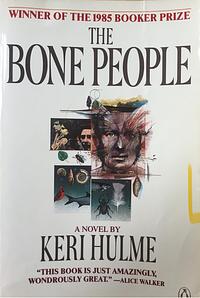You need to sign in or sign up before continuing.
Take a photo of a barcode or cover
Breathtaking. This book/Keri Hulme is a gift and every New Zealander should read it (also, everyone else should read it). I couldn’t put it down - the characters are so beautiful, the content so challenging, and the sense of place and space so spectacular you feel like you are right there. I did feel torn about the neat ending - as others have pointed out, it jars a little with the rest of the book, which is harshly realistic. I’d like to think of it as Hulme’s knowingly optimistic, wishful, wistful ode to the way things should be and the way stories should end.
dark
emotional
reflective
slow-paced
Plot or Character Driven:
Character
Strong character development:
Yes
Loveable characters:
Yes
Diverse cast of characters:
Yes
Flaws of characters a main focus:
Yes
dark
slow-paced
Plot or Character Driven:
Character
Strong character development:
Complicated
Loveable characters:
No
Diverse cast of characters:
Yes
Flaws of characters a main focus:
Yes
The good parts of this book: The prose is interesting and complicated, if a little pretentious. Even though most of the book doesn’t really have a plot, I didn’t find it boring
HOWEVER, the characters are just straight up.. horrible people, and in the last 100 pages, there is just fantastical deus ex machinas out of left field. A happy ending randomly after quite a harrowing start to the book.
HOWEVER, the characters are just straight up.. horrible people, and in the last 100 pages, there is just fantastical deus ex machinas out of left field. A happy ending randomly after quite a harrowing start to the book.
Graphic: Child abuse, Gore, Mental illness, Physical abuse, Toxic relationship, Violence
Moderate: Ableism, Child death, Pedophilia, Suicidal thoughts
challenging
dark
emotional
hopeful
reflective
sad
slow-paced
Plot or Character Driven:
Character
Strong character development:
Complicated
Loveable characters:
Complicated
Diverse cast of characters:
Yes
Flaws of characters a main focus:
Yes
Have had this on my to-read list since 2012 but couldn't find a Kindle version. Finally got around to requesting it from the library, and am so glad I didn't give up on getting to it. It's not an easy book to read but so worthwhile. The first thing I loved about it was the language, particularly when the story focuses on Kerewin, whose original voice, obvious intelligence, unique perspectives and poetical talents combine to make reading her story a real delight. Her life is not a happy one in many ways, as the independence she values and protects so fiercely also isolates and depresses her, but she is an amazing and always interesting character. I also really enjoyed the uniquely New Zealand culture, tradition and quirks that the book is steeped in. The Maori religious and ancestral aspects in the book gave it a mystical, mysterious, magical realism feel which is also a favourite genre of mine when done well. The character of Simon, the damaged but indomitable unspeaking boy, who reawakens a sense of joy, compassion, purpose and wholeness in Kerewin and his foster father Joe, is so well crafted and also a delight to read, even though he experiences such pain and heartache while doing so. The book definitely exposes some of the darker aspects of human nature, including brutal family violence, alcoholism, estrangement, death and damaged relationships. Ultimately it is a hopeful book though and not a depressing one, as love and persistence win out in the end, restoring relationships if not physical damage. I was sorry to reach the end. It will definitely stick with me though, and I'm putting it in my all-time favourites category.
Read for my NZ Lit course. My favorite book for the course so far. This is a fantastic novel that attempts (and in my opinion, succeeds) to find a way forward for a bicultural New Zealand. While it is definitely a Maori and a New Zealand novel, its lessons should not be lost on those of us from other non-homogenous countries.
I also loved the book's spiral structure. It begins at the end and spirals back around, and loops in the reader in the process. The story does take a while to build up steam, but once it does (about 100 pages in) it's hard to put it down. Keri Hulme's narrative style might be a little off-putting to some, as she's certainly not direct or "clear" in the traditional Western narrative sense. Sometimes the text spirals around meaning, leaving room for multiple interpretations. A little difficult, to be sure, but in a delightful way, and in a way that really makes you feel like part of the process. You aren't just absorbing information, you're an active participant in the story's telling.
And there's lots of good feminist and environmentalist moments that I adored. An excellent all-around book. I can't think of a single flaw.
I also loved the book's spiral structure. It begins at the end and spirals back around, and loops in the reader in the process. The story does take a while to build up steam, but once it does (about 100 pages in) it's hard to put it down. Keri Hulme's narrative style might be a little off-putting to some, as she's certainly not direct or "clear" in the traditional Western narrative sense. Sometimes the text spirals around meaning, leaving room for multiple interpretations. A little difficult, to be sure, but in a delightful way, and in a way that really makes you feel like part of the process. You aren't just absorbing information, you're an active participant in the story's telling.
And there's lots of good feminist and environmentalist moments that I adored. An excellent all-around book. I can't think of a single flaw.
Hulme's work is difficult—both because of her prose style and because of her subject matter. I admired the first quite a lot, but found it difficult to reconcile myself with many aspects of the latter, particularly as the book wore on. The first part of the book was so resolutely realistic that I found the later quasi-magical realistic elements to be a little jarring. I also found myself... well, almost repulsed by the ending. Hulme, I think, wants the reader to have found enough sympathy for Joe to sustain the book's optimistic ending. After the graphic and sustained depiction of child abuse, however, that was impossible for me.
The language is certainly beautiful, and as a story of cultural renewal in a post-colonial landscape, it's intensely powerful. I do not regret having read The Bone People, and there is a lot to take away from it. I just don't know if I will be able to come back to it.
The language is certainly beautiful, and as a story of cultural renewal in a post-colonial landscape, it's intensely powerful. I do not regret having read The Bone People, and there is a lot to take away from it. I just don't know if I will be able to come back to it.
emotional
reflective
sad
slow-paced
Plot or Character Driven:
Character
Strong character development:
Complicated
Loveable characters:
Complicated
Diverse cast of characters:
Yes
Flaws of characters a main focus:
Yes
Graphic: Child abuse, Death
Moderate: Child death, Death of parent
I bought it for university to write my intercultural studies paper about my kiwi roots. I did not enjoy the book at all, even tough it's one of the most famous books from new zealand to have ever been published.
This book has a soul. Or maybe three. Gorgeous writing and a a whole new world of connection to the workings of our emotions. I lived this book as if I were any of the three main characters. I just wish there were more novels by this author. I would eat them up!





